Review for Babylon 5: Season 1
Introduction
Babylon 5 is Earth’s first great contribution to the galaxy, a massive space station located in neutral space, a monument to peace and co-operation, with a quarter of a million inhabitants. It’s where the five great powers meet, Humans, Minbari, Centauri, Narn, and Vorlons, as well as the League of Non-Aligned Worlds, to peacefully resolve their differences, to trade, to just get along. At least that is the dream, one that its commander Jeffrey Sinclair has resolved to turn into a reality. But given the quarrelsome nature of the ambassadors, particularly the Narn G’Kar and the Centauri Londo Mollari, that’s a difficult ambition to achieve, made all the harder as it becomes clear that many on Earth don’t believe in the Babylon project anymore. On top of that, there are lingering resentments between the Minbari and Earth Alliance, following the war ten years previously in which the all-powerful Minbari inexplicably surrendered. Sinclair fought on The Line in that final battle, although when it comes to the Minbari surrender, there’s a gap in his memory, and the Minbari Ambassador Delenn’s enigmatic nature doesn’t help. As for the Vorlon Ambassador Kosh, no one knows what he’s thinking...
The first 22 episodes of Babylon 5 are presented in this Season 1 Collection, Signs and Portents, across 6 discs.
Disc 1
1. Midnight on the Firing Line
2. Soul Hunter
3. Born to the Purple
4. Infection
Disc 2
5. Parliament of Dreams
6. Mind War
7. The War Prayer
8. And the Sky Full of Stars
Disc 3
9. Deathwalker
10. Believers
11. Survivors
12. By Any Means Necessary
Disc 4
13. Signs and Portents
14. TKO
15. Grail
16. Eyes
Disc 5
17. Legacies
18. A Voice in the Wilderness (Part I)
19. A Voice in the Wilderness (Part II)
20. Babylon Squared
Disc 6
21. The Quality of Mercy
22. Chrysalis
Picture
Babylon 5 Season 1 gets a 1.78:1 anamorphic PAL transfer on these discs. The show was originally broadcast as 4:3, but it was actually shot on film for a widescreen ratio, and then edited on video for 4:3, with the effects added at that point. For the DVD release, they went back to the original film materials; most of the live action footage is restored from there. But unlike the extensive restoration for the Next Generation Blu-ray, where they actually put the money in and recreated the effects shots, Babylon 5 only had the original effects to work with. So we have for the most part, crystal clear, live action footage of feature film quality, sharp, clear, and rich with detail, albeit blighted by a fair degree of print damage, scratches and blips. The space FX shots, all CG are taken from the 4:3 video source and are of NTSC resolution, scaled up for PAL, and zoomed in on top of that to get a 1.78:1 aspect ratio. Some of the framing is awkward at times, but consistency helps to sell the effects here. It’s the worst of both worlds when it comes to composite shots though. Any live action shot where a special effect takes place, A PPG, or actors with the interior of the station in background, also has to be taken from the video source, scaled up from NTSC to PAL, and zoomed in to get the widescreen ratio. You might have been watching a sharp and clear widescreen image, and suddenly it drops to VHS quality, the framing gets awkward, everything crammed in, and you know that an effects shot is imminent, or a cross-fade edit.
It’s not the primitive nature of the digital effects that lets the side down, it’s the inconsistency of the widescreen transfer.
Sound
You have the choice between DD 5.1 English and German, as well as DD 1.0 mono French, with subtitles in these languages, Dutch, Swedish, Arabic and Turkish. The show was originally broadcast in stereo, so the surround doesn’t offer much more than that in the way of discreet placement of effects and action. But still, the general experience is quite immersive, and enjoyable. The dialogue is mostly clear, although volume levels are low. An occasional flick on of the subtitles might be required. Christopher Franke quickly sets the show’s style, one of symphonic electronica.
Extras
You get six discs in an Amaray case, with four discs on either side of two central hinged panels, and two discs front and back, a fine economy of space. The inner sleeve has an episode listing. Each disc presents its contents with animated menus.
Disc 1 offers a 55 second introduction to the collection from creator J. Michael Straczynski.
Disc 3 has an audio commentary to accompany episode 13, Signs and Portents, supplied by J. Michael Straczynski. It’s a useful, if rather gappy commentary that looks at the episode in particular, as well as the series as a whole. He’s also sure to point out the first urinal shown in sci-fi television.
Disc 6 offers an audio commentary to accompany episode 22, Chrysalis, also from J. Michael Straczynski, which is significantly more informative, and also looks at the final episode of season 1 in context of the whole series, in case you’re avoiding spoilers. Actually, it’s best to leave all the commentaries and extra features right to the end if you’ve never seen Babylon 5 before.
There are also two Behind The Scenes Documentaries on the final disc.
The Making of Babylon 5 dates from 1994, and is a special presented by Star Trek’s Walter Koenig who also played Bester in B5, which takes us behind the scenes of the first season of the show. It’s presented in 4:3 and lasts 18:53.
Back to Babylon 5 was contemporaneous with the DVD release, and catches up with the cast and crew in 2002, offering a retrospective angle on the show. This lasts 12:51.
The Universe of Babylon 5 is a video glossary for the show, a computer voice explaining some of the terms and offering a tour of the station in short video clips.
Conclusion
I didn’t like Babylon 5’s first season when I originally watched it broadcast. Of course back then, I had no idea what was about to unfold over the next five years. People were more forgiving of television back then, more willing to give a show a chance, especially when there was such a dearth of sci-fi on television. I actually stuck with Star Trek: The Next Generation for 3 years before it delivered on its promise, and while I had my problems with Babylon 5, I did like it enough to stick with it. Back then I was taking it at face value, assuming it to be an episodic drama, and was evaluating each episode on its own merits, and while there are some great episodes in the first season, some of the stand-alone stories still aren’t that good. Of course in retrospect it becomes clear just how much J. Michael Straczynski was seeding in that first season, just how much foreshadowing he was doing, so that there really aren’t any stand alone stories in the first season, it’s all one big novel.
The second problem I had with Babylon 5’s first season was the lead character, Jeffrey Sinclair, and that is a problem that still lingers with me for this re-watch, although I have to say that this time around, I’m mellowing more to the character, finding nuance and depth that I missed originally. But I do feel that he is a character out of time, that he really belongs in a sixties sci-fi, captain of the Seaview, the Jupiter 2, or the Enterprise. I don’t know how much was the way the character was written, and how much was down to Michael O’Hare’s portrayal, but Sinclair always stood out like a sore thumb in a cast that was very much in the nineties vernacular.
As with any new series it takes a while for the cast to settle in, to really find their characters, and the first half of season 1 can be a little hit and miss, with a couple of ropey, even hackneyed stories. Also for this first season, the aliens are a lot more interesting than the humans, the antagonism between G’Kar and Londo lights up the screen in a way that ensures that they’ll remain central characters as the series progresses. Delenn’s ethereal surety makes for an interesting contrast to the bickering Narn and Centauri, although the depths to Kosh are yet to be revealed, beyond a large suit constantly talking in riddles. A few episodes in, the ambassador’s aides are all revealed, even though Londo’s neurotic aide Vir is there from the first. Delenn’s aide Lennier is charmingly naive but enthusiastic, while Na’Toth has a decidedly sadistic streak to her in how she deals with G’Kar.
In contrast it takes a while for the humans to settle in, for Susan Ivanova to lose the severe Russian pessimism and develop more of a pragmatist sense of humour, and watching this first series, I recall how Garibaldi’s style took a while to click with me, and he seemed kind of frivolous at first. The problem with both Dr Franklin and the telepath Talia Winters is that they are sporadically used, appearing in the occasional episode, and as such their characters aren’t developed as well.
Contrasts and comparisons were always made with Star Trek, and especially Deep Space Nine, that universe’s space station show, and while ultimately the two became drastically different animals, in this first season of Babylon 5, and especially for some of the stand alone episodes there are similarities in storytelling style, especially for episodes like Believers, where Dr Franklin fights to save a child’s life in direct opposition to the boy’s religious beliefs. The one difference is the ending of the episode, which in Star Trek would have been a lot happier.
Of course the biggest difference between the two worlds is that humanity hasn’t ‘evolved’. Star Trek had its utopia, but Babylon 5’s world is comparable to our own, with people still motivated by the same wants, the same ambitions as we are today. These are colourful, varied, believable characters, society is still stratified into the haves and the have-nots, and greed and the profit motive can sway individuals, as well as the desire for power, which is all what motivates Babylon 5’s overall story.
While some of the individual episodes feel a little lacking in the first half of the run, there’s a whole lot of world building going on, setting up the antagonism between the Centauri and the Narn, the wary peace between Earth Alliance and Minbar following a war that inexplicably ended with Earth snatching victory from certain defeat, and also the fractious politics that informs Earth’s presence in the stars. From the first moment in the series, it seems that Babylon 5 is living on borrowed time, constantly being stiffed when it comes to funding, and a political pass-the-parcel back home that no-one wants to end up holding. On top of that add an increasing anti-alien sentiment that bubbles over on more than one occasion into violent xenophobia, and it becomes clear that Babylon 5’s mission of peace is little more than a pipe-dream, that humanity’s ideals are constantly being undermined by people’s selfish nature. Throw the telepaths into the mix, a recent phenomenon on Earth, rapidly becoming a society of Homo-superior, and tensions are even more fraught.
Then you have the character arcs that develop with this background, Sinclair’s missing 24 hours of memory at the end of the Minbari war, Delenn’s mysterious involvement with this, G’Kar relishing his species’ sudden superiority, and looking to payback for years of Centauri subjugation, while Londo’s lament is one of representing a dying Empire, drowning himself in drink, wishing for the glory days again.
This all coalesces around episode 13, Signs and Portents, where the character of Morden makes his first appearance on the station. I had no idea what the Shadows were the first time, and had no idea what the deal that Londo makes with Morden would result in. The first time I saw this it was just another episode that hinted at another power in the galaxy besides those established. But watching it now, with the benefit of hindsight, this is where Babylon 5 really becomes its own animal, it’s the episode that grabs your attention and doesn’t let go. There are some stand alone episodes thereafter, such as TKO and Grail, the former of which is in my opinion the last really weak episode, but you stay hooked for the overarching story.
It gets really good too, with episodes like Eyes which sees Sinclair’s command questioned, with the unrest on Mars mentioned in the background. That unrest flares up in the Voice in the Wilderness two part episode, which also has a key development regarding the planet that B5 orbits, again sowing a seed for future storylines. Then one mystery is cleared up in Babylon Squared, just what happened to Babylon 4, but it also reveals a whole new mystery, as well as introducing the memorable Zathras. Then there is the final episode, Chrysalis, where everything changes, the real strength of the Shadows is revealed, where Londo makes that deal with the devil, where the turmoil back on Earth culminates in a major turning point in history, and of course we get the season cliff-hanger... Will Garibaldi survive? And just what is happening to Delenn?
Babylon 5 is hit and miss for its first season, but thankfully, the majority of the misses are in the first half. And knowing how the full five years would play out makes the first year better in retrospect, it has a lot more meaning in the larger picture. My one niggle with the first season would be resolved in the second, as lead actor Michael O’Hare left the show at this point, resulting in the new station commander, John Sheridan taking over. Sinclair’s final words in this season were “Nothing’s the same anymore”, and given what was yet to come were surely an understatement.
7/10
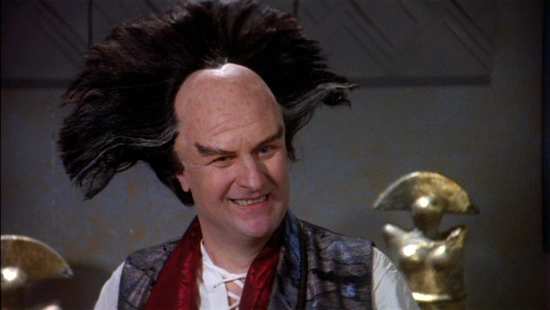
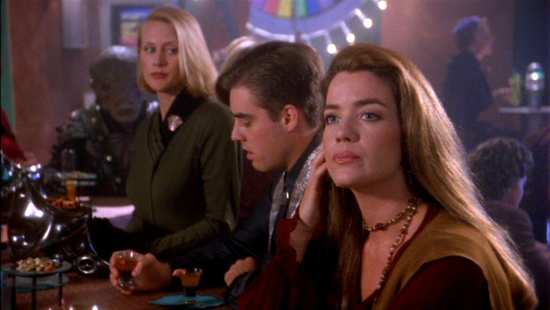

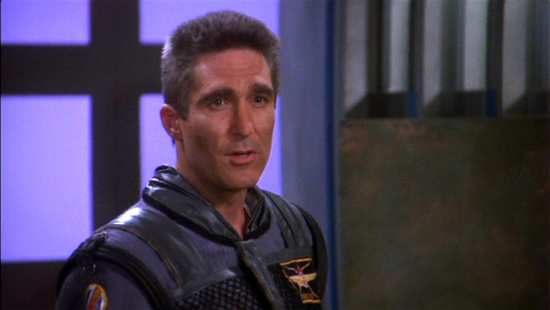
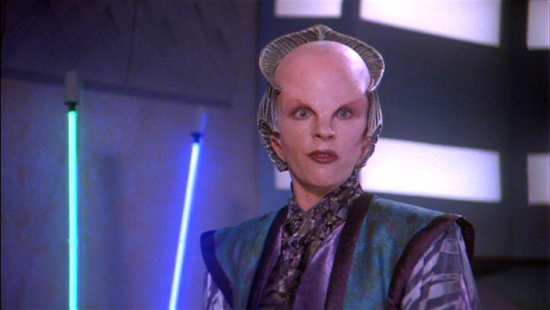
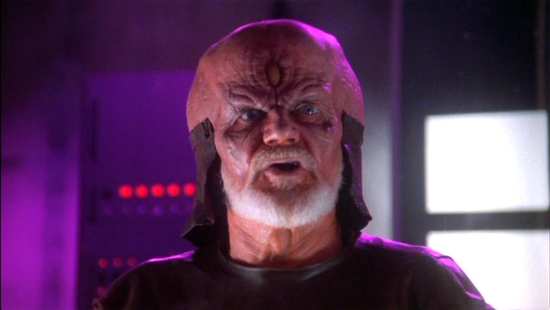
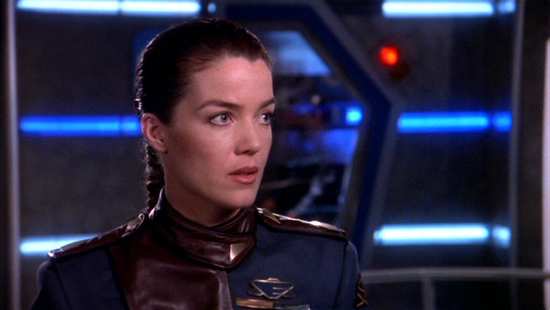
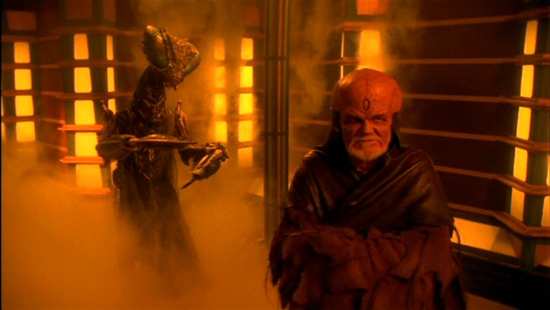
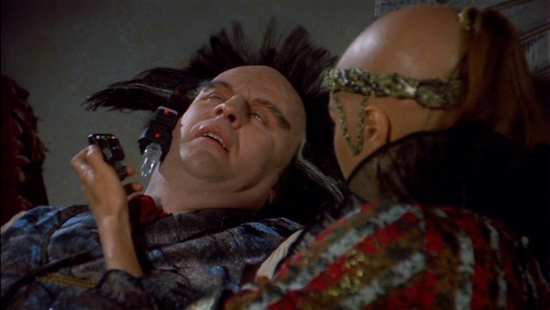
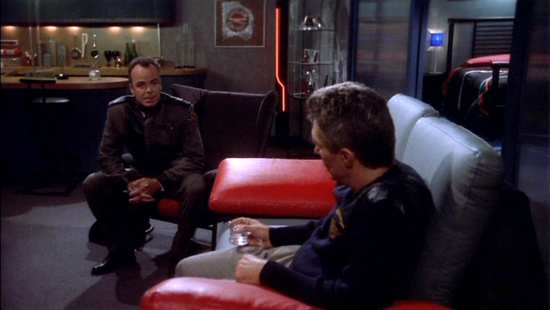
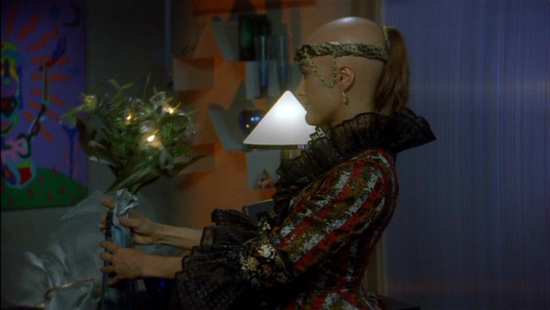
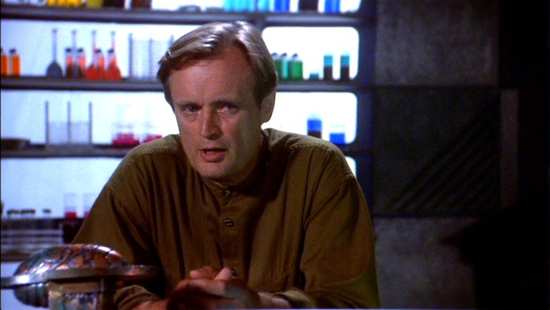

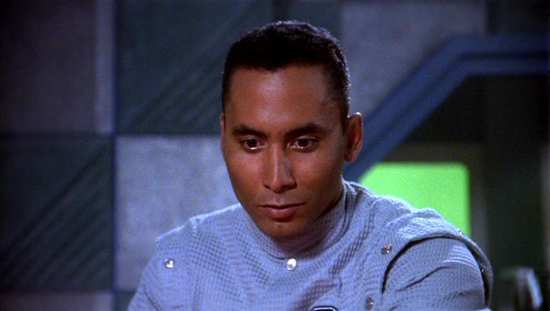
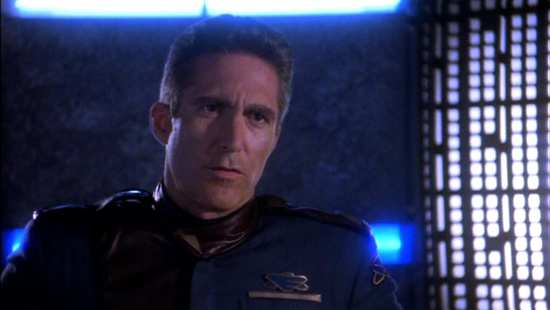
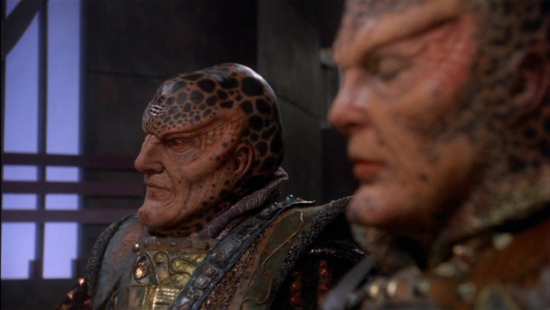
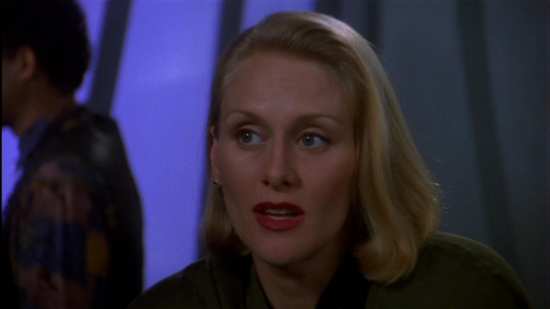
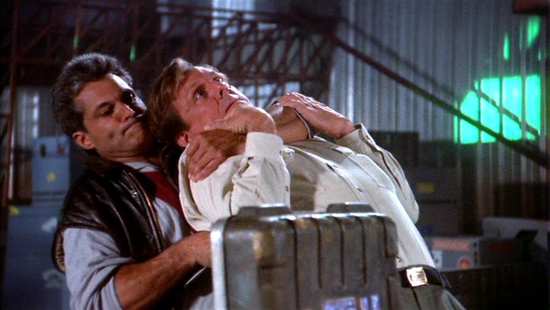
Your Opinions and Comments
Long story short - O'Hare had been suffering a debilitating psychiatric condition during the filming of the first season & O'Hare chose to leave and return when his treatment permitted to conclude his character arc.
Straczynski promised O'Hare to keep the reason for his departure to his grave, but O'Hare only asked him to keep it until he reached his grave.
I hadn't realised that Richard Biggs (Dr. Stephen Franklin) was almost deaf and had to learn everyone else's lines so he could effectively lip-read his cues.